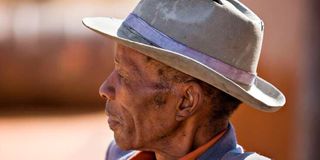Retired men are an endangered species

A recent article about men in retirement highlights that they lose status because of reduced economic power since they no longer earn a steady income.
What you need to know:
- A recent article about men in retirement highlights that they lose status because of reduced economic power since they no longer earn a steady income.
- in Kenya, retirement almost always means returning to the rural areas, which comes with demotion from the finer elements of life such as choice whiskies to harsh local liquor in search of company and excitement.
- Many of these men face physical, social and financial abandonment by their wives and children.
The 2019 Kenya National Population and Housing Census shows that among people aged 50 and above, the number of women surpasses that of men except in the 50-54 cohort. This suggests that women have a longer lifespan. As it were, old age comes with its unique gender-related challenges one of which is violence against older men, manifested in various forms.
A recent article about men in retirement highlights that they lose status because of reduced economic power since they no longer earn a steady income and their ability to provide has waned. They lose their hitherto unchallenged authority in the household and are unable to actualise their masculinity. This attracts derision and disrespect that punctures their egos and exerts psychological harm.
Typically in Kenya, retirement almost always means returning to the rural areas from urban centres. This often comes with demotion from the finer elements of life such as choice whiskies to harsh local liquor in search of company and excitement.
The men ignore social and medical advice about reckless drinking. Studies show that men resort to such defiance to reclaim their threatened masculinity. With this comes further degradation, behavioural maladjustment and erosion of nutritional and health status. Logically, early death follows.
Treated as alien
Many of these men face physical, social and financial abandonment by their wives and children. Typically, the children concentrate on their mother and treat their father as an alien. For example, they lavish her with gifts, trips and shopping while only giving their father a token stipend.
In some cases, they cut off communication with their father to resent his exercise of authoritarian discipline among them when young. In other words, it is payback time. The painful part is most of these fathers spent their earnings educating the same children hence, their penury in old age. Definitely, the men feel betrayed and regretful for the overt and covert forms of violence meted out on them.
The children’s resentment is sometimes deliberately cultivated by the mothers. A discussion on gender-based violence with a community in Limuru showed that mothers alienate children from the fathers by depicting the latter as irresponsible drunks, Casanovas and spendthrifts who do not even have time to visit in boarding school.
A case was cited of a mother who always reminded the son about his father’s “uselessness” whenever handing over to him pocket money, notwithstanding that the cash was actually given to her by the husband. In the eyes of the innocent child, the father was the villain and the mother the heroine.
Of course, it is not true that all fathers lack time for their families. In fact, many men lack time because they have to be away fending for them at great cost, a reality often taken for granted.
Sexual abandonment
Perhaps the most hurting part is the sexual abandonment and frustration older men face. A study of agricultural communities in western Kenya reveals that widowers who remarry, often younger women than them, face double jeopardy.
First, these wives neglect them nutritionally and even physically assault them. Because they have to survive, the men are forced to carry out domestic chores they were not accustomed to due to their socialisation. While this is not necessarily wrong, it distorts their mentality about themselves and lowers their esteem in the eyes of the community.
Loss of esteem
Second, because the men have lost sexual vigour due to age or disease, the wives resort to romantic escapades with younger men, to the embarrassment of the husbands leading to further loss of esteem. The men also face loneliness because of their wives’ pre-occupation with religious activities, business and social welfare groups.
With the run-away problem of teenage pregnancies, many of the older men have to re-assume parenting for their grandchildren left behind by deceased or unmarried daughters who have fled to town. This again relates to the expectation that men must provide regardless of circumstances. This brings to mind the government social protection schemes.
The Economic Survey of 2020 shows that the Older Persons Cash Transfer benefits more women than men. In the 2019/20 financial year, it benefited 467,265 women compared to 297,379 men, a clear demonstration of the gender skew.
This is probably informed by the fact that a majority of caregivers for vulnerable children are women. In 2019/20, the cash transfer for caregivers went to 235,339 women compared to 59,968 men, probably based on an assumption or presumable fact that income channelled through women is more likely to benefit a wider spectrum of beneficiaries than that given to men.
In this context, would it be wrong to say that older men are an endangered species that require some attention?
The writer is an international gender and development consultant and scholar. ([email protected])





